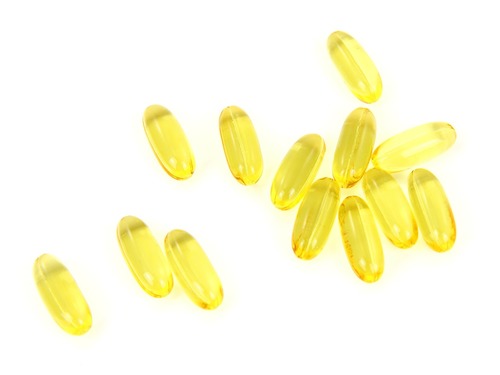Is Fish Oil Bad For You?
Also Known As: omega-3
Short answer
Fish oil supplements are generally not bad for you, but there is a lot of misinformation about its benefits. While getting Omega-3s from natural sources shows a positive correlation with disease prevention and management, no such correlation has been proven for fish oil supplements.
Recommended Alternative
A fairly even ratio of beneficial and harmful qualities. Moderation is important. Very general topics that can lean towards both sides of the spectrum will be placed here as well. Rice, for example, can be good or bad depending on the type.
View Full Grading System
Category 'A'
Very healthy and numerous health benefits. Side effects are rare. Things rated an 'A+' are typically necessary for survival (for example, water).
Very healthy and numerous health benefits. A few harmful qualities may be associated, but only under certain circumstances such as an allergic reaction.
Very healthy and numerous health benefits. Harmful qualities may be associated, but aren't usually serious.
It is important to note that even the best things in life can become bad in immoderate amounts. So, although something may be rated an 'A+', overconsumption/overdoing can bring unwanted effects.
Category 'B'
Very beneficial to your health. Things rated a 'B+' may have a few harmful qualities to pay attention to.
Overall beneficial to your health. Things rated a 'B' may have some harmful qualities to pay attention to.
More beneficial to your health than not. However, harmful qualities are most likely associated and shouldn't be overlooked.
The main difference between category 'A' and category 'B' is the harmful qualities typically present in 'B' items. Serious side effects are usually uncommon, but are still possible and should be taken note of.
Category 'C'
Both beneficial and harmful qualities associated. Things rated a 'C+' are typically a bit more on the beneficial side. Still, moderation is important.
A fairly even ratio of beneficial and harmful qualities. Moderation is important. Very general topics that can lean towards both sides of the spectrum will be placed here as well. Rice, for example, can be good or bad depending on the type.
More harmful than beneficial. Side effects are common, especially when consumed/done excessively. Moderation is very important.
Category 'C' usually denotes to both good and bad qualities. When it comes to this category, it is important to keep this word in mind: moderation.
Category 'D'
Harmful to your health. Although benefits may be associated, the bad most likely outweighs the good. Moderation is very important.
Harmful to your health. A few benefits may be associated, but the bad outweighs the good. Moderation is extremely important.
Harmful to your health. Very few, if any, benefits are present. Things in this category should be avoided as much as possible.
Category 'D' is typically for things that are more harmful than beneficial. While consuming/doing something unhealthy once in a blue moon shouldn't hurt, we definitely recommend eliminating 'D' items as a regular part of your routine/diet.
Category 'F'
Category 'F' is for things that fail to bring anything beneficial to the table, and are very harmful to your health. We recommend completely avoiding anything in this category. Long-term side effects of 'F' items are usually very serious.
Category 'N'
'N' stands for neutral. Things placed into this category are generally (a) neither good nor bad for you, or (b) lack the necessary evidence to reach any conclusions.
Long answer
Fish oil supplements are among the most consumed products in the United States, to the tune of over one billion dollars annually. Since the beginning of 2014, as many as 10% of Americans were taking fish oil supplements. Fish oil is primarily procured from mackerel, salmon, herring, halibut, tuna, and other fatty fish. Additionally, whale blubber and seal blubber are also sometimes used to extract fish oil.
The prime ingredients in fish oil are Omega-3 fatty acids. Omega-3 fatty acids are considered vital to brain function and normal growth and development. They are also widely believed by the general public to actively prevent illnesses such as cancer, heart disease, stroke, etc. While Omega-3 fatty acids may provide some protection against the aforementioned problems, there has yet to be conclusive evidence that fish oil supplements provide the same protection as getting Omega-3s from real fish or other food sources such as walnuts, flaxseed oil, canola oil, and soy oil.
Another thing to consider is that taking fish supplements can have unpleasant side effects, the most common being fishy breath and a fishy taste in the mouth. However, more serious side effects, such as nausea and upset stomach may occur. Consuming more than 3 g daily may also lead to internal bleeding.
Possible short-term side effects
- nausea
-
upset stomach
-
fishy breath
Possible long-term side effects
- internal bleeding (if overconsumed)
Benefits
- may help prevent cancer
-
may help prevent stroke
-
may help prevent heart attack
Our Wellness Pick
(what is this?)
Nordic Naturals Omega-3
- High-potency EPA & DHA
- Supports brain health
- Promotes heart health
- Lemon-flavored
- Non-GMO
Learn More!
Please turn your Ad Blocker off to see this content. Thank you!
Thank you for your feedback!
Written by Jeff Volling
Published on: 12-29-2015
Last updated: 12-15-2023
Thank you for your feedback!
Written by Jeff Volling
Published on: 12-29-2015
Last updated: 12-15-2023

 Approved by
Approved by 















